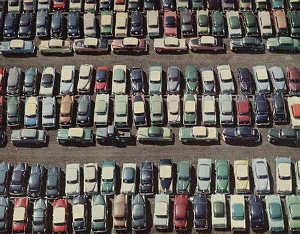Beware Of Fake Parking Apps

In a concerning trend, motorists are falling prey to deceptive online parking apps that dupe users into unnecessary fees and subscription costs.
A recent investigation by consumer advocate Which? has unearthed a surge in fake advertisements for popular parking payment apps appearing prominently in online search results.
Worryingly, these misleading adverts trick unsuspecting private and motor trade drivers into divulging their bank details to third-party websites.
The fraudulent websites mimic well-known parking payment apps by adopting similar wording and branding.
While purporting to offer a ‘free download,’ the fine print commits users to steep monthly subscription fees.
This tactic mirrors schemes previously used to deceive drivers into paying for fictitious clean air zone charges, such as London’s ULEZ.
How to steer clear of scam parking apps
Which? strongly advises drivers to use official Apple or Google Play app stores exclusively. They also advise motorists to avoid online search engines like Google, Yahoo, and Bing when downloading parking apps.
Genuine parking app companies face a significant challenge due to the proliferation of fake websites, with scammers swiftly launching new sites shortly after removal of fraudulent ones.
According to research, Google had a higher prevalence of fake adverts than its counterparts. In response, Google asserted its commitment to removing ads violating policies, emphasising its disapproval of misleading information under the misrepresentation policy.
Under the new Online Safety Act, Google, other search engines, and Meta (formerly Facebook) will be legally obligated to remove scams and other harmful content.
If encountering a fake parking app advert on Google, users are encouraged to report it to the Advertising Standards Authority immediately.
Navigating Parking in the UK
Parking in the UK can be perplexing, with various rules in multi-storey car parks, pay-by-app streets, and roadside machines.
In this instance, we look at some of the regulations surrounding parking on yellow lines, a common source of confusion.
Single yellow lines indicate different parking restrictions, contingent on accompanying signs and the time of day.
If no sign is present, parking is typically allowed outside restricted hours. Signs accompanying the lines provide specific instructions, indicating restricted hours or other limitations.

These rules can vary across villages, towns, and cities, dictated by local authorities and councils. Familiarise yourself with the local parking regulations to avoid potential fines.
Apart from single yellow lines, various road lines convey specific instructions to drivers:
White Lines: Solid white lines indicate no crossing unless safe and necessary. Double solid white lines prohibit crossing, except in specific circumstances, like turning into or out of side roads or as directed by authorities.Bus and Cycle Lanes: Lanes marked with specific images or words indicate vehicle types allowed. Driving or parking in these lanes can result in fines.Zigzag Lines: These lines signify a no-stopping zone, strictly prohibiting parking.
As private and motor trade drivers navigate the complexities of parking regulations, vigilance and awareness are crucial to avoiding potential scams and adhering to road safety guidelines.
Remember, if you accrue any points from traffic violations, it’s essential to inform your insurance company ASAP; not doing so can invalidate your private or motor trade insurance policy.







